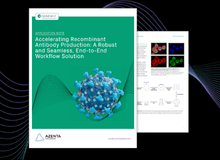Recombinant Antibody Production
Recombinant antibody production service combines gene synthesis with codon optimization for expression and purification of desired antibodies. The applications for recombinant antibodies (rAbs) are varied across biomedical and toxicological research. Monoclonal antibodies produced recombinantly are often used as biochemical markers, detection tools, or for developing effective therapeutic treatments that target cancer, autoimmune disorders, and a broad range of other diseases.
GENEWIZ from Azenta equips researchers with a range of flexible and tailored solutions that save valuable time and accelerate innovation.
How do recombinant antibodies work?
Recombinant antibodies (rAbs) work by recognizing and binding to individual antigenic sites on virtually any molecule, such as hormones, microbial antigens, and cell receptors.
What are recombinant monoclonal antibodies?
Recombinant antibodies are a type of monoclonal antibodies that are generated in vitro from a synthetic gene – cloning antibody genes into expression vectors without the use of a hybridoma. Read our blog post for more info.
In recombinant antibody production, monoclonal antibodies are produced artificially through genetic engineering and other related techniques. Genetically engineered antibodies are specifically valuable in scientific research due to their ability to recognize individual antigenic sites on almost any molecule including drugs, hormones, microbial antigens, and cell receptors. Recombinant antibodies that react with cancer antigens, for example, can be used to identify cancer cells in tissue samples and ultimately fuel the the development of cancer-fighting drugs and therapies.
Advantages of Recombinant Antibodies
- Increase reproducibility, control and consistency
- Faster production time over hybridoma technology
- Easier to switch antibodies into a preferable format
- Animal-free process
For more frequently asked questions (FAQs) please visit our antibody FAQ page.
Features and Benefits
Technical Resources

Application Note | Accelerating Recombinant Antibody Production
Recombinant antibody production is a cornerstone of modern biotechnology and research, but it faces the significant challenge of achieving high yields. In this application note, discover how to enhance expression efficiency while reducing production times with an optimized vector backbone workflow.


